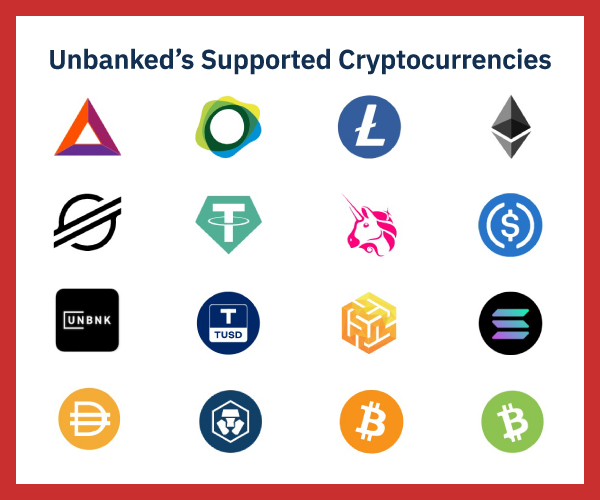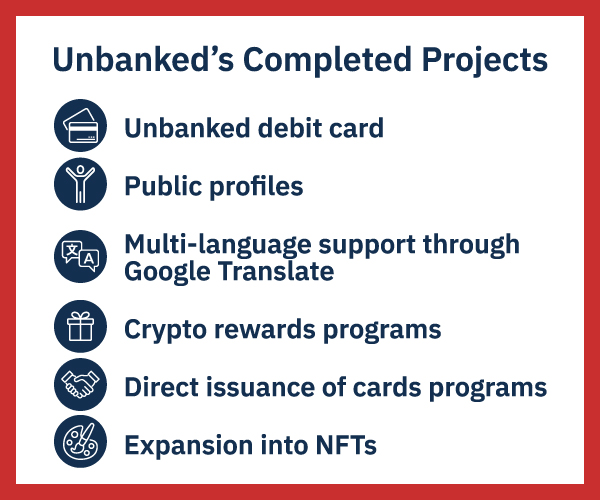Note: This recommendation was co-authored by KingsCrowd Investment Research Manager Olivia Strobl.
Both Olivia and I have played in the cryptocurrency space for years. Like many crypto enthusiasts, we were first drawn to digital assets for their versatility. The blockchain — which powers cryptocurrency — has a number of use cases, from peer-to-peer transactions to international payments. Now, thanks to companies like Unbanked, cryptocurrencies are more versatile and easy to use than ever.
With a debit card powered by Unbanked, you could walk into your local grocery store and pay for your food with cryptocurrency. That’s no small feat. One of the major things holding cryptocurrency adoption back is its clunky user experience for everybody — buyers, sellers, traders, and holders, as well as retailers accepting purchases made with cryptocurrency.
Unbanked allows users to pair their cards with Apple, Google, or Samsung Pay to make payments. They can use their cards at thousands of retailers worldwide, including Walmart, Walgreens, and 7-11. Users from more than 200 countries can swap fiat money (government-issued paper currency) for cryptocurrency with Unbanked’s debit cards. Banks, credit card companies, retailers, and players in the cryptocurrency market can white-label Unbanked’s platform and have customized cards made for their own company. For example, the Litecoin Foundation has a Litecoin Card powered by Unbanked available in the U.K. and Europe.

In bridging cryptocurrency with traditional finance systems, Unbanked is filling a huge gap in the cryptocurrency ecosystem. The value proposition is clear and compelling. For the cryptocurrency industry, it’s not a nice-to-have. It’s a must-have.
Critically, Unbanked is not doing this by working with a single bank, crypto coin, or crypto company, nor by offering itself up as a crypto bank or neobank. Founder and CEO Ian Kane made it very clear that the company does not fall into the neobanking category. Rather, it provides the financial technology that undergirds the infrastructure for crypto-neobanking.
The company is a card issuance platform that white-labels its technology and provides program management. Unbanked is BYOB, aka “bring your own brand.” And the brands that Unbanked has brought in are quite impressive. In addition to the Litecoin Foundation, Unbanked also has Nexo, Paxful, StormX, and Stacks on board.
If this impressive traction sounds familiar, it’s because Unbanked’s current raise is its third (and probably final) offering in the online private markets. Formerly known as Ternio BlockCard, Unbanked raised on Republic in 2020 and 2022. The 2022 raise was rated a Top Deal by the KingsCrowd team. And we continue to be very bullish on the company’s prospects in its current raise on StartEngine.
Long Time No See
We’ve established that Unbanked has a strong value proposition. But for investors, that’s not enough. We also need to confirm that it has the chops to execute on that proposition. It’s been only five months since Ian and his team closed their 2022 round with more than $2.2 million in commitments. And the Unbanked team has made significant progress in such a short time. But given how recently the Republic raise closed, we did not expect all the milestones to be reached. So — in all fairness — we’re rating the company’s performance on a curve.
Using the product road map from Unbanked’s last raise, let’s look at what it did and didn’t accomplish (along with what’s still in the works).

First, let’s look at the completed projects. Unbanked released a debit card that can purchase crypto assets. It rolled out multi-language support using Google Translate but would like to improve the system. The crypto rewards programs and direct issuance of card programs in the European Union are fully in place. Asia-Pacific, the Middle East, and Africa are expected to be rolled out later this year. This is a massive step in terms of regulatory hurdles and leaves substantial room for growth and an even larger moat of defensibility.
We’re most excited about Unbanked’s expansion into the NFT space. The team did a banker’s NFT drop with the artist who created the Pudgy Penguins collection. This will segue into its exclusive relationship with American Express to launch NFT cards. If a user owns an NFT, they can get it printed onto a card which will be linked to their wallet.
Unbanked also developed a “public profile” feature that enables customers to create a custom profile which becomes a publicly shared URL. Customers can then post the link on their website or social media accounts. It was supposed to make it easier to collect mobile payments when on the go. But so far, the company says, it’s generated little interest.
There are also projects that haven’t been completed. Some have been tried but abandoned for good reason. For example, the decentralized and centralized lending and borrowing did not compete with solutions like BlockFi and Celsius.
Some projects evolved over time. Ian and the team originally wanted to have a two card offering, but rather than introduce a new card for spending stablecoins (among other capabilities), they decided to introduce a stablecoin functionality as software tied to the existing cards to conserve capital. A full launch is expected in the coming weeks. Using this faster and less costly approach, Unbanked will proceed with a single card with multiple functionalities.
A few other projects are still in the early stages of development. Business bank accounts are only partially rolled out because Unbanked is proceeding with caution. Ian wants to make sure they aren’t servicing customers with nefarious intentions (which we applaud) — like helping customers convert their ill-gotten small business administration loans into cryptocurrency.
Similarly, Unbanked has made some progress on the partnerships front. The company has approved 10 new white label programs. Many of its signed-up partners have delayed their launch, which is out of Unbanked’s control. Nonetheless, this was an impressive goal to hit.
And then there are the projects on the road map that are complete but not yet live. The “sell” crypto function — which will allow large crypto deposits to be sold and converted into cash — should be released soon. With the debit card, there are federal spending limits. But with the “sell” crypto feature, a user could, in theory, deposit a million dollars instantly into their account with Unbanked. Ian mentioned that some of the white label partners wanted the function specifically to pay bills.
The functionality to buy or hold almost any asset on the Unbanked platform is also complete, though this feature is not yet public. Custodian costs are significant. More than that, with prices still trending down, there does not appear to be much demand. But when the crypto market rebounds and demand rekindles, the capabilities could be rolled out relatively quickly.
Considering we just saw Unbanked close a raise late last year, this traction is impressive. Apart from last year, the company’s financials provide further evidence, with annual revenue up more than 100% in 2021. This short-term progress — and infrastructure build-out to support longer-term growth — provides a solid foundation for the company’s future plans.
A Volatile Space
All of that is not to say that it will be smooth sailing. This is the volatile crypto space, after all. And 2022 was just the most recent evidence that bumpiness is part of the journey. Despite everything Unbanked accomplished — developing its products, signing up more than two dozen card programs, and growing its customers to 150,000 and card holders to 50,000 — Unbanked saw its revenue drop by half in 2022.
The hard truth is, when cryptocurrency falls, it falls hard. And it usually takes the entire market with it. There’s not much Unbanked can do about this. The majority of the stronger crypto companies tend to survive these down periods. They simply bide their time, improving their products and technology while waiting for the inevitable rebound.
Admittedly, many of the weaker companies do fall by the wayside. And that’s painful for investors who thought their investments would grow along with the sector itself.
We’re convinced that Unbanked is one of the stronger companies in its space. It’s not the only one. Marqeta is another company with card-issuing software technology operating on a global basis.
But Unbanked is on a path to be one of the leading companies in its space. And if you believe that cryptocurrency — despite its ups and downs — is here to stay, it’s hard not to believe in Unbanked. The risks are the risks. Unbanked’s global reach and pick-and-shovel approach to the market mitigates those risks only somewhat. As investors, we just have to accept the considerable regulatory, macroeconomic, and volatility risks that come with the crypto territory.
We’re okay with that.
But only because we’re confident that crypto will come back and flourish again. It always does. And don’t forget that crypto is still an emerging sector. It’s still figuring things out. Unbanked is very much part of that effort. And that’s a good thing. Cryptocurrency has a ton of growth in its future. The companies — like Unbanked — that successfully figure out that future also ensure themselves a place in that bright future brimming with possibility and upside.
That’s why we’re so bullish on Unbanked. Its $115 million valuation is not cheap. But you’d be investing in a company whose founders — Ian Kane and Daniel Gouldman — have shown the ability to execute at the highest levels. They’ve brought the company a good distance already.
We believe they can bring it a lot further.
Deal Details
Startup: Unbanked
Security type: SAFE
Valuation: $115 million
Minimum investment: $250
Where to Invest: StartEngine
Deadline: April 14, 2023
How to Invest
Unbanked is raising capital on StartEngine. If you don’t already have an account, you can sign up for one here.
Once you’re logged in, visit the Unbanked raise page. Be sure to review the deal page and offering documents thoroughly before making an investment. When you’re ready, click the teal “invest now” button. Enter in the amount you want to invest, starting as low as $250, and then move through the required steps. Make sure that your investment is confirmed, and then you’re good to go.
Risk
Startup investing is inherently risky, and startup investors should expect to hold their investments without liquidity for five to 10 years. Never invest more money than you can afford to lose.